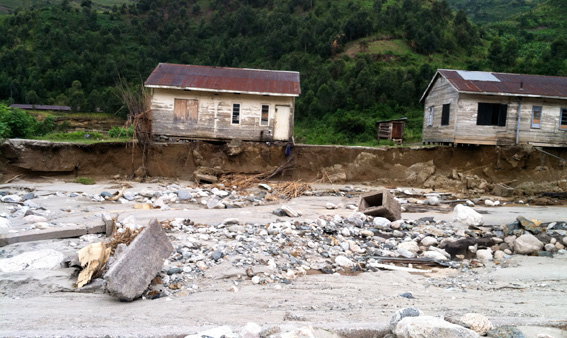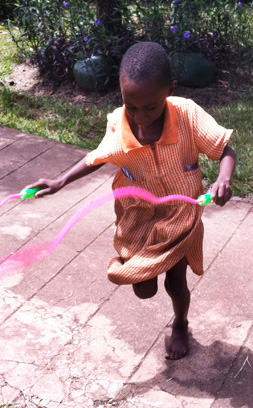Hearing Bach’s cantatas at Emmanuel Church each week has encouraged me to listen in a whole new way. I carried this evolving aural ability with me as I traveled to Uganda to learn about the health and wellbeing of women and children.
I set off with two other American women into a rural mountainous region near the Democratic Republic of Congo. A few days prior to our arrival, a massive flood had swept away entire villages in the Rwenzori Mountains, leaving a wide plain of mud and debris in the town of Kasese, where we were staying. Kasese’s main hospital had been knocked from its foundations, and the Anglican medical center we had come to visit overflowed with disaster victims as well as its regular patients. Healthy newborn babies lay in rooms with people suffering from cholera. Cancer patients requiring immediate surgery were waiting for the water to be restored so that the surgical tools could be sterilized. The lights flickered off and on, and the overwhelmed medical staff was working 20+ hours a day. They had no time to speak with us.

A few days before the group’s arrival, a massive flood swept away whole villages.
Photo by Shan Overton
Funded by the Louie Crew Scholarship from The Oasis of the Episcopal Diocese of Newark (NJ), I had gone to Kasese with two other women in order to listen to and learn from Ugandan women about the good medical care and health education they had received from the center. Our plan was to hear from the women themselves and from the midwives who cared for them and their babies. But a disaster zone is not an appropriate environment for reflections about women’s day-to-day lives and long-term plans—there are too many urgent tasks requiring attention. Thus, my companions and I offered as much help as we could, but spent most of our time watching the unfolding drama.
As the days passed, we spent less and less time at the medical center and more and more time in the upper class hillside neighborhood where we were housed. While there, we met a little girl whom I will call Isabella for the sake of her privacy. She is an AIDS orphan, a child whose father is unknown and whose mother is unable to care for her due to disease and poverty. Living with distant relatives who offer her shelter, food, clothing, and basic care, Isabella has had little schooling or healthcare, and her actual age (most likely or ) is unknown. While she did not speak English and was at first very shy around us, she was curious and soaked up our language once she decided we were trustworthy. One member of our group, Sarah, a college student, spent a lot of time teaching Isabella to say words in English, which Isabella subsequently used in her communications throughout our stay. Sarah played jump rope with her, taught her children’s songs in English, showed her how to write her own name, and gave her drawing paper and pens. We began to enjoy gifts of drawings and English words in a child’s handwriting – as well as the happy sound of Isabella’s voice echoing across the courtyard as she enthusiastically sang the new songs she’d learned.

One of Shan’s travel companions taught a child called “Isabella” to sing and jump rope. Photo by Shan Overton
One afternoon while listening to Isabella sing, I realized that, while I had planned to travel across two continents and an ocean to hear the voices of adult women talking about their experiences as midwives and mothers, the real situation offered something else altogether. What I actually heard, clear as a bell on that hill in southwestern Uganda, was the still, small voice of one little girl. I thought I was going to Uganda to get involved in systemic change of healthcare for women and infants. But, hearing Isabella’s voice, I ended up being convinced that the only change – the best change – that I could effectively make was in the life of this one child.
My travel companions and I, along with some other interested supporters, have decided to make Isabella’s education and health the focus of our efforts to make life better for women and girls in Uganda. We have committed to seeing Isabella through primary and secondary school as well as college and graduate school, should she wish to attend. We have also agreed to pay her health care fees (checkups, immunizations), to buy her school supplies (uniforms, pencils, paper), and to make sure she has an adequate place to study and sleep (desk, lamp, bed, bedding, malaria net). By educating Isabella (for amounts of money so low that it seems almost absurd), we hope to help her and, by extension, to help all Ugandan women and girls. With our support, Isabella will be equipped to have a happy and productive life as an educated professional woman, and she will be in a much better position than we are to help others with stories like hers.
Listening to the small voice of Isabella has changed me. Instead of focusing on a collective voice of women and babies, I am now committed, with a group of people in my own country, to one girl. Isabella has become part of my extended family. I invite you to listen, too, so that you can make a difference in the life of this girl or others like her.
– Shan Overton
This article appears in the 2014 Winter issue of Voices.

